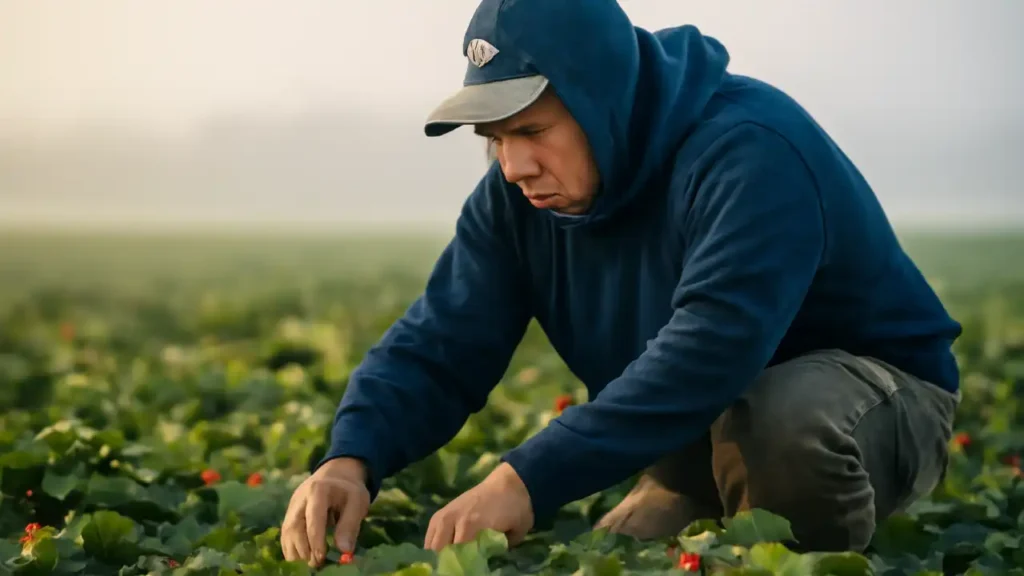The sun-kissed geography and volcanic soil of Sicily generates some of the most fertile farming regions in Europe. To anyone who might be thinking of taking up agricultural work on this Mediterranean island, knowing the facts about farm employment may assist you in getting ready to meet the challenges and the joys of what is ahead.
Sicilian agricultural jobs provide an exclusive chance to enjoy the true Italian countryside life and earn money at the same time during the most productive harvest periods. This guide includes all the information about the common job duties and working conditions as well as more practical issues such as accommodation and legal considerations.
Types of Agricultural Work Available
Seasonal Fruit Harvesting
The warm climate of Sicily allows the production of agriculture all year round, and various crops need labor during the seasons. The orange and lemon crops are usually harvested between November and April, giving regular winter work when the other European agricultural areas are less busy.
Grape harvesting is done in late summer and early fall, and in most cases, between August and October. The jobs tend to have some of the best working conditions because many vineyards have higher standards of treating the workers and housing them.
Olive Oil Production
Olive harvesting is done between October and December. Sicily is one of the best places to produce olive oils in Italy and employees usually prefer these jobs compared to picking fruits because they are less strenuous. The task entails picking olives manually or with the help of a machine, and helping in the preliminary processing.
Vegetable Farm Work
Vegetables grown year round are tomatoes, peppers, eggplants, and leafy greens. Such jobs are usually more regular in hours and have longer employment than picking fruit.
Conditions and Expectations of work
Physical Demands
Sicily is a place where one needs to be physically fit to work in the farm. Workers usually work 8-10 hours a day in outdoor conditions and they usually start their work early in the morning to beat the heat of the day. Lifting, carrying, bending, and standing are some of the tasks.
Temperatures in the summer regularly reach over 85 30 C, so hydration and sun protection is necessary. Employees are expected to be ready to deal with dusty environment and sometimes with agricultural chemicals, but it is the duty of the employer to provide the employees with the necessary protection.
Hours and Scheduling
The majority of the farm jobs have seasonal working hours depending on the crop and the weather patterns. Six days a week is the norm during high seasons of harvest. The morning shifts usually start at 5:00 or 6:00 AM to ensure that the working hours are cool.
Other farms pay on a piece-rate basis in which workers are paid according to the amount harvested as opposed to hourly pay. Such a system may boost incomes of effective employees but they need to know about the payment system before taking up jobs.
Compensation and Benefits
Wage Expectations
In Sicily, agricultural wages depend greatly on the crop, the season and the employer. The minimum wage in Italy is between 7-10 euros per hour which is the legal rate of compensation applicable to agricultural workers but this can vary depending on a number of factors.
Skilled employees with a knowledge of particular harvesting methods receive higher rates, as well. Other jobs provide bonuses on achieving production goals or finishing contracts without being absent.
Additional Benefits
Most agricultural employers offer simple lodging, including group dormitories to more basic apartments. Meals can be provided, especially breakfast and lunch at working time. There is sometimes transportation to and fro work site and this is mostly in remote areas.
Legal Requirements and Documentation
Work Permits
Citizens outside the EU need to have the right to work in the field of agriculture in Sicily. The EU citizens are free to work but are required to register with local authorities when staying more than 90 days.
Seasonal worker visa program enables non-EU citizens to work temporarily in Italian agriculture, but the visa must be applied prior to arrival at the Italian consulates in home countries.
Tax Obligations
Italian income taxes and social security contributions are paid by all the agricultural workers. The deduction of wages is usually done by employers, but employees are supposed to know their responsibilities and have the right records to pay taxes.
Finding Agricultural Employment
Recruitment Agencies
There are a number of agencies that are focused on the placement of agricultural workers all over Sicily. These organizations usually take care of documentation, transportation and accommodation arrangements making it easier to international workers.
Direct Farm Contact
Going to farms directly during pre-harvest can be a source of employment. Most operations would want to employ workers that are willing to work in full seasons as opposed to short-term jobs.
Local Job Centers
The Italian employment offices (Centri per l’Impiego) have lists of agricultural jobs. These are free government services that can give information on the rights and legal requirements of workers.
Living in Rural Sicily
Accommodation Options
Farmers normally live in employer housing, apartments or temporary accommodations close to work places. Qualities are also very different, and it is worth checking the living conditions before taking the jobs.
The countryside can be deprived of such amenities as shops, restaurants, and medical institutions. Employees ought to prepare and be aware of how to get to services through transportation.
Cultural Considerations
The Sicilian rural societies tend to be conservative and closely knit families. Simple knowledge of Italian words and respect towards local traditions can make a huge difference in working relations and experience.
Most of the rural Sicilians also speak local dialects, as well as standard Italian, which may present some communication difficulties at first but also offers a chance to enjoy local culture at its best.
Health and Safety Considerations
Sun Protection
The sun in Sicily is very strong, so protection is needed at all times. Employees are advised to purchase quality sunscreen, protective clothes, and wide-brimmed hats. Heat-related illnesses can be avoided through precaution and hydration.
Workplace Safety
The genuine agricultural employers offer safety gears and training on the use of tools and chemicals. Employees are not supposed to compromise safety and must report unsafe conditions to their bosses or the authorities.
Seasonal Opportunities Throughout the Year
Spring (March-May)
Planting of vegetables and early harvests offer a lot of opportunities. The weather is usually good so this is a good time to bring in workers who are new to Sicilian agriculture.
Summer (June-August)
The harvesting of vegetables is highest in summer. Higher temperatures demand extra precautions, however, there is a lot of employment.
Autumn (September-November)
Autumn is primarily an employment season of grape and olive harvest. Such jobs tend to have better working conditions and cultural experiences of wine and olive oil production.
Winter (December-February)
The citruses are harvested in winter, when there is little agricultural work in northern Europe. It is not too hot, which makes outdoor activity more comfortable.
Making the Most of Your Experience
Skill Development
Farming in Sicily provides a chance to learn conventional farming, food production, and sustainable farming. The skills may prove useful in the future career or life.
Language Learning
Language acquisition is faster when one is immersed in Italian-speaking working conditions. A great number of employees discover that their Italian becomes much better during agricultural seasons.
Cultural Immersion
Laboring with Sicilian farmers offers real cultural experiences that cannot be obtained through tourism. The overall experience is enhanced by attending local festivals, acquiring traditional recipes, and knowing about rural life.
Prepare for Your Agricultural Adventure
Sicilian farming is both physically demanding and culturally enriching as well as beautiful. Realistic expectations, proper preparation and respect of local customs and working conditions are the key to success.
Study prospective employers carefully, know the legalities of your citizenship status and get physically ready to work outdoors. Agricultural work in Sicily is a good option that can offer a valuable experience and a job with a little planning and the opportunity to visit one of the most authentic parts of Italy.
It is also possible to find other people working in the field of agriculture on the internet, in online forums or social media groups to exchange experiences and advice. Such networks can be a good source of information regarding particular employers, working conditions, and tips on how to live in rural Sicily.



